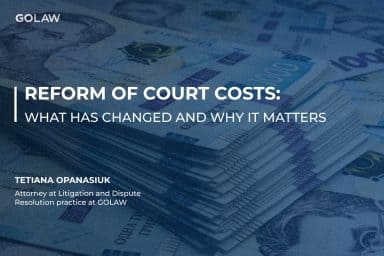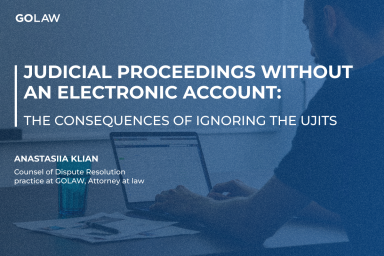Expropriation of property during the war: instructions for business
Contents
- In what forms is it possible to deprive of property under martial law?
- Who can expropriate the property under martial law?
- Documenting the expropriation of property
- Valuation of property subject to expropriation
- Obtaining reimbursement of the value of expropriated property
- Using the capacity of enterprises for defense purposes
Due to the Russian military aggression on February 24, 2022, martial law was imposed throughout our country, which is currently extended until August 23, 2022.
Restrictions provided for in this legal regime may apply directly to business entities.
Thus, the Law of Ukraine “On the Legal Regime of Martial Law” provides that the military command together with military administrations in the legal regime of martial law have the right to:
- use the capacity of enterprises, institutions and organizations of all forms of ownership for defense purposes;
- expropriate the property, which is in private or communal ownership;
- seize the property of state enterprises, state economic associations for the needs of the state.
In this article, we will consider the main points that business need to know in connection with the expropriation of property or the use of enterprise capacity in martial law and provide recommendations for minimizing the possible negative consequences of such measures.
In what forms is it possible to deprive of property under martial law?
The Law of Ukraine “On Transfer, Expropriation or Seizure of Property under the Legal Order of Martial Law or State of Emergency” operates on two main concepts:
– Expropriation of property – deprivation of the owner of the right of ownership of property that is in private or communal ownership, and which becomes the property of the state for use in martial law, provided the fact of previous or subsequent full reimbursement of its value;
– Seizure of Property – deprivation of state enterprises, state economic associations of the right of economic management or operational management of state property for its transfer for the needs of the state.
Thus, business property may be transferred to state ownership during the martial law only within the procedure of expropriation of property and provided the fact of prior or subsequent full reimbursement of its value.
However, the law does not specify which types of property can be expropriated. This can be both movable (vehicles, equipment) and real estate (buildings, structures, etc.).
Who can expropriate the property under martial law?
The Law of Ukraine “On Transfer, Expropriation or Seizure of Property under the Legal Order of Martial Law or State of Emergency” stipulates that expropriation of property under martial law is carried out by a military command agreed with the regional, district, Kyiv or Sevastopol city state administrations or executive body of the relevant local council.
It should be added that in accordance with the Decree of the President of Ukraine “On the Establishment of Military Administrations” of February 24, 2022 № 68/2022 military administrations were established; regional, Kyiv city state administrations and heads of these administrations acquire the status of relevant military administrations and heads of these military administrations; relevant district military administrations have been established on the basis of existing district state administrations.
It is also important to understand who, according to the law, belongs to the military command, which is empowered to decide on the expropriation of property. Thus, in accordance with the Law of Ukraine “On the Legal Regime of Martial Law”, the military command is:
- Commander-in-Chief of the Armed Forces of Ukraine,
- Commander of the Joint Forces of the Armed Forces of Ukraine,
- Commanders of types and separate branches of troops (forces) of the Armed Forces of Ukraine,
- Commanders (chiefs) of military administration bodies,
- Commanders of formations, military units of the Armed Forces of Ukraine and other military formations formed in accordance with the laws of Ukraine.
At the same time, in areas where hostilities are taking place, the expropriation of property is carried out only by the decision of the military command without appropriate approvals. Note that as of May 6, 2022, the order of the Ministry of Reintegration approved an updated list of territorial communities located in areas of military (combat) operations.
Documenting the expropriation of property
An act of expropriation of property must be drawn up. It is necessary to follow the correctness of its composition because it is made on a single sample.
This act must contain the following information:
1) the title of the military command and the body that agreed on the decision on expropriation of property, or the military command or body that made such a decision;
2) information on the owner (owners) of the property;
3) information on the document establishing the ownership of the property (if available);
4) a description of the property sufficient for its identification. For immovable property – information on the location (address), for movable property (land, water and air vehicles) – information on vehicle registration number, mark, model, chassis number, year of manufacture and other registration data;
5) the amount of funds paid (in the case of prior full reimbursement of the value of the property).
The act is signed by the owner of the property or his legal representative and authorized persons of the military command and the body that agreed (adopted) the decision on expropriation of property with the seal of the military command and/or these bodies.
The right of state ownership of property subject to expropriation arises from the date of signing the act.
Under martial law, the expropriation of property can sometimes be carried out in the absence of its owner. In this case, the act is drawn up without the participation of the owner and at the earliest opportunity is handed over against receipt to the person from whom the property is expropriated, or his authorized representative.
Valuation of property subject to expropriation
During the procedure of expropriation of property, the conclusion on the value of the property on the date of its valuation, which was carried out in connection with the decision on its expropriation, is attached to the drawn up act.
Therefore, the expropriation of property must be preceded by its valuation, which must be carried out by professional estimators. However, in case of impossibility to involve estimators, such valuation of the property may be carried out by state and local self-government bodies in agreement with the property owner. In case of refusal or absence of the owner of the property, these bodies have the right to conduct such valuation independently. Property valuation can be challenged in court.
In case of disagreement with the valuation of the property to be expropriated, it is recommended to indicate your objections on the reverse side of the act and, if available, refer to the documents on the real value of the property. Therefore, if possible, business representatives should conduct an inventory and market valuation of the property in advance to further document their position on the value of such property in the event of its expropriation.
Obtaining reimbursement of the value of expropriated property
As noted above, the expropriation of property is subject to full reimbursement of its value: the previous (before the direct expropriation of property) or the next (which is carried out after the expropriation of property).
Prior full reimbursement of the value of the expropriated property is based on the conclusion on the value of the property on the date of its valuation, which was made in connection with the decision to expropriate it.
Obtaining the next full compensation for the expropriated property is possible after the abolition of martial law. To do this, the former owner of the property must apply to the territorial center of recruitment and social support at the place of expropriation of property with a statement, which is accompanied by an act and a document containing a conclusion on the value of the property.
All disputes related to the reimbursement of the value of expropriated property are resolved in court.
It is important that if after the abolition of the martial law the expropriated property is preserved, and the former owner insists on the return of the property, such return is carried out in court. The basis for the return of property is a court decision that has entered into force. At the same time, the owner undertakes to return the amount of money received by him in connection with the expropriation of the property, less a reasonable fee for the use of this property.
In addition, the former owner of the property that has been expropriated may request another property in return, if possible.
Using the capacity of enterprises for defense purposes
The law stipulates that the military command, together with military administrations, has the right to use the capacities of enterprises, institutions and organizations of all forms of ownership for defense purposes. However, unlike the expropriation of property, the procedure and conditions for implementing this measure are not detailed at the legislative level. Prior or subsequent compensation for business losses or other guarantees, compensation are also not expressly provided by law.
If the military command intends to use the capacity of the business for defense purposes, we recommend, if possible, ensuring the presence of competent personnel to carry out ongoing monitoring and documentation of all operations to use the company’s capacity. This is especially important in cases where the company can only employ people who have undergone special training and education, or have complex computer equipment or other difficult to use technical means, flammable and explosive substances, etc.
In addition, it is recommended to draw up an act by analogy with the act of expropriation of property under martial law. Such an act must be signed by a representative of the enterprise, on the one hand, and a representative of the military command, representatives of the military administration and/or local council, on the other hand. The act must specify which property of the enterprise will be used for defense purposes, and how.
Therefore, in martial law, the rights and legitimate interests of business may be limited. However, the application of the measures of martial law must be carried out by the procedure established by law. At the same time, each situation is individual, so to minimize the risk of significant losses, we recommend you to seek full professional consultation.
The material has been prepared especially for “AIN.UA“.
If you have any questions about the operation of your business during martial law, please contact GOLAW experts and we will give answers to all questions.

Kateryna Tsvetkova
Partner, Litigation and Dispute Resolution practice, Attorney at law
- Contacts
- 31/33 Kniaziv Ostrozkykh St, Zorianyi Business Center, Kyiv, Ukraine, 01010
- k.tsvetkova@golaw.ua
- +38 044 581 1220
- Recognitions
- LEXOLOGY INDEX 2025
- The Legal 500 EMEA 2024
- Who's Who Legal 2022 - 2024
Sign up to be aware
New achievements are inspired by information. GO further, don’t miss out GOLAW news and legal alerts
Our expertise
-
- Antitrust and Competition
- Banking and Finance
- Compliance, Corporate Governance and Risk Management
- Corporate and M&A
- Criminal and White Collar Defence
- Defense in Anti-corruption procedures and regulations
- Labor and Employment
- Natural Resources and Environment
- Government Relations (GR)
- Insolvency and Corporate Recovery
- Intellectual property
- International trade
- Legal support of business and private Сlients in Germany
- Litigation and dispute resolution
- Private clients
- Real Estate and Construction
- Energy and Natural Resources
- Restructuring, Claims and Recoveries
- Martial Law
- Tax and Customs
-
- Agribusiness
- Aviation
- Chemical industry
- Engineering, Construction and Building Materials
- Natural Resources and Environment
- Financial institutions
- IT and AI
- Industry and manufacturing
- Healthcare industries, Life sciences and Pharmaceuticals
- Media, Entertainment, Sports and Gambling
- Retail, FMCG and E-Commerce
- Transport and Logistics
We use cookies to improve performance of our website and your user experience.
Cookies policy
Cookies settings







